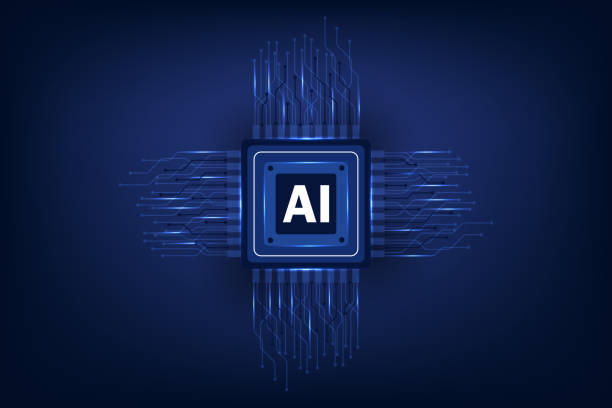What is Artificial Intelligence and How Does It Work?

#Artificial_Intelligence (AI) refers to the ability of a computer system to mimic human cognitive functions such as learning, problem-solving, and decision-making.
This broad field includes various techniques and approaches, such as Machine Learning, Neural Networks, Natural Language Processing (NLP), and Computer Vision.
AI aims to build machines that can think, learn, and act independently.
The foundation of AI’s operation is based on algorithms and mathematical models that allow systems to extract patterns from data and make predictions or decisions based on them.
In summary, Artificial Intelligence is an effort to create systems that can perform tasks currently requiring human intelligence.
Tired of your company’s website not being seen as it deserves and losing potential customers? Solve this problem forever with professional and effective website design by Rasawp!
✅ Increase brand credibility and attract customer trust
✅ Attract targeted sales leads
⚡ Contact us now for a free consultation!
History and Evolution of Artificial Intelligence

The idea of building thinking machines dates back centuries, but the official birth of artificial intelligence as a scientific field is attributed to the Dartmouth Conference in 1956.
At this conference, leading scientists such as John McCarthy, Marvin Minsky, and Claude Shannon gathered to explore the possibility of building machines that could think like humans.
The early decades of AI were marked by optimism and rapid advancements in areas such as problem-solving and game-playing.
However, hardware and algorithmic limitations caused the field to face periods of stagnation.
In recent decades, significant advancements in computer processing power, access to big data, and the development of new algorithms have brought AI to a new peak.
Today, AI is used in a wide range of applications, from Autonomous vehicles to medical diagnosis.
Different Types of Artificial Intelligence

Artificial Intelligence can be categorized into various types based on their capabilities and applications.
A common categorization includes Narrow AI, General AI, and Super AI.
Narrow AI is designed to perform specific tasks and excels at them (e.g., facial recognition or language translation).
General AI, which has not yet been fully realized, refers to a system that can perform any task a human can.
Super AI surpasses human intelligence and can outperform humans in any field.
Another categorization is based on learning methods, which include Supervised Learning, Unsupervised Learning, and Reinforcement Learning.
Each of these methods is suitable for a specific type of problem and data.
| Type of AI | Description | Example |
|---|---|---|
| Narrow AI | Focused on performing specific tasks | Siri, Alexa |
| General AI | Ability to perform any task a human can | Still under development |
| Super AI | Beyond human intelligence | Hypothetical |
Machine Learning and its Role in Artificial Intelligence

Machine Learning (Machine Learning) is one of the main subfields of Artificial Intelligence that enables systems to learn from data without explicit programming.
In fact, instead of being given specific instructions, machines are given data, and they find patterns and relationships in the data themselves.
This approach allows for the creation of systems that can adapt to new data and improve their performance.
Machine learning algorithms are used in a wide range of applications, including image recognition, speech recognition, financial market prediction, and recommender systems.
There are various types of machine learning algorithms, including regression, classification, clustering, and dimensionality reduction.
The choice of the appropriate algorithm depends on the type of data and the problem to be solved.
Tired of losing business opportunities due to not having a professional corporate website? Worry no more! With Rasawp’s corporate website design services:
✅ Your brand’s credibility and professionalism will increase.
✅ You will attract more customers and sales leads.
⚡ Get a free consultation now to start!
Applications of Artificial Intelligence in Various Industries

Artificial Intelligence is rapidly penetrating various industries, changing how we work and live.
In healthcare, AI is used for diagnosing diseases, developing drugs, and providing personalized care.
In the manufacturing industry, AI is used for process optimization, predicting equipment failures, and quality control.
In the financial sector, AI is used for fraud detection, risk management, and providing financial advisory services.
Also, AI has numerous applications in areas such as transportation (autonomous vehicles), education (adaptive learning systems), entertainment (content generation), and security (threat detection).
In summary, AI has the potential to revolutionize almost every industry.
Challenges and Concerns Regarding Artificial Intelligence

Despite its many benefits, Artificial Intelligence also brings challenges and concerns.
One of the biggest concerns is the impact of AI on the job market.
Process automation and the replacement of human jobs by machines can lead to widespread unemployment and increased economic inequality.
Another concern is bias in AI algorithms.
If the data used to train algorithms is biased, AI systems may also make discriminatory decisions.
Furthermore, issues related to privacy, security, and control of AI are also of high importance.
The development of ethical and responsible AI, taking these challenges and concerns into account, is of particular importance.
The Future of Artificial Intelligence and Upcoming Prospects

The future of Artificial Intelligence looks very bright.
With continuous advancements in hardware, algorithms, and data accessibility, AI is expected to play an increasingly important role in daily life and various industries.
In the future, we can expect to see the development of smarter, more autonomous, and more adaptable AI systems.
Fields such as robotics, virtual reality and augmented reality, the Internet of Things, and data science will also be greatly influenced by AI.
However, to realize the full potential of AI, it is necessary to address the challenges and concerns related to this field and provide appropriate solutions for them.
| Field | Impact of AI | Example |
|---|---|---|
| Healthcare | More accurate diagnosis, personalized treatment | Cancer detection using imaging |
| Manufacturing Industry | Process optimization, cost reduction | Smart industrial robots |
| Finance | Fraud detection, risk management | Automated trading algorithms |
Resources and Tools for Learning Artificial Intelligence

If you are interested in learning Artificial Intelligence, many resources and tools are available to you.
Online courses (such as Coursera, edX, and Udacity), books, scientific articles, and practical tutorials can help you learn AI concepts and techniques.
Programming languages like Python and libraries such as TensorFlow and PyTorch are powerful tools for developing AI projects.
Also, participating in online communities and AI events can provide good opportunities for learning, networking, and collaborating with other enthusiasts in this field.
With sufficient time and effort, you can acquire the necessary skills to enter the world of Artificial Intelligence.
Are you dissatisfied with the low conversion rate of visitors to customers on your e-commerce website?
Solve this problem forever with professional e-commerce website design by Rasawp!
✅ Increase visitor-to-customer conversion rate
✅ Create an excellent user experience and build customer trust
⚡ Get a free consultation
Key Concepts in Artificial Intelligence

To better understand Artificial Intelligence, familiarity with some key concepts is essential.
These concepts include algorithms, data, models, neural networks, deep learning, natural language processing, computer vision, and robotics.
Algorithms are a set of instructions that tell computers how to perform a specific task.
Data are information used to train and evaluate AI models.
Models are mathematical representations of relationships between data.
Neural networks are models inspired by the structure of the human brain and are used to learn complex patterns in data.
Deep learning is a subfield of machine learning that uses deep neural networks for learning.
Natural language processing enables systems to understand and generate human language.
Computer vision enables systems to understand images.
Robotics deals with the design and construction of robots that can perform physical tasks.
Ethics in Artificial Intelligence

As Artificial Intelligence advances, ethical questions surrounding this technology also gain greater importance.
The decisions made by AI systems can have profound impacts on people’s lives.
Therefore, it is essential to pay attention to ethical issues such as transparency, accountability, fairness, and privacy in the design and development of AI systems.
Transparency means we should be able to understand how AI systems work and the reasons behind their decisions.
Accountability means we should be able to identify the individuals or organizations responsible for the consequences of AI system actions.
Fairness means that AI systems should not make discriminatory decisions.
Privacy means that individuals’ personal data should be protected and used responsibly.
Adhering to these ethical principles is essential for developing trustworthy and beneficial AI.
Frequently Asked Questions
| Question | Answer |
|---|---|
| 1. What is Artificial Intelligence (AI)? | It is a branch of computer science that aims to create machines capable of simulating human intelligence and performing tasks that require human thinking, such as learning, problem-solving, and decision-making. |
| 2. What are the main types of Artificial Intelligence? | They can be classified into Narrow AI, which focuses on a specific task; General AI, which possesses comprehensive human capabilities; and Super AI, which surpasses human intelligence. |
| 3. Name some common applications of AI in our daily lives. | These include voice assistants (such as Siri and Alexa), recommendation systems (such as Netflix and Amazon), self-driving cars, facial recognition systems, and spam filters. |
| 4. What is the difference between AI and Machine Learning? | AI is the broader concept of creating intelligent machines, while Machine Learning is a subset of AI that focuses on enabling systems to learn from data without explicit programming. |
| 5. What is Deep Learning? | It is a subset of Machine Learning that uses multi-layered artificial neural networks (deep neural networks) to process data and discover complex patterns, and is used in image and speech recognition. |
| 6. What are the main benefits of AI? | Improving efficiency and productivity, automating repetitive tasks, making better decisions based on big data analysis, and developing solutions for complex problems in fields such as medicine and science. |
| 7. What are the main challenges facing the development and deployment of AI? | These include the need for vast amounts of high-quality data, privacy and security issues, bias in data and algorithms, and high development and maintenance costs. |
| 8. Does AI raise ethical or social concerns? | Yes, it raises concerns related to privacy, algorithmic bias, job displacement due to automation, responsibility for errors made by intelligent systems, and the need for a regulatory framework. |
| 9. How can AI affect the future of the job market? | It can lead to the automation of some routine jobs, but it will also create new jobs requiring advanced skills in developing, operating, and maintaining AI systems. |
| 10. What are some recent or promising technologies in the field of AI? | These include advanced Natural Language Processing (NLP) (such as large language models like ChatGPT), computer vision, robotics, and Generative AI. |
And other advertising services from Rasa Web advertising agency
- Smart Customer Journey Map: A combination of creativity and technology for online growth by using real data.
- Smart Conversion Rate Optimization: Designed for businesses seeking online growth through user experience customization.
- Smart Brand Identity: Designed for businesses aiming to increase website traffic through key page optimization.
- Smart Marketplace: A combination of creativity and technology for campaign management through marketing automation.
- Smart Direct Marketing: A dedicated service for campaign management growth based on intelligent data analysis.
And over a hundred other services in the field of internet advertising, advertising consultation, and organizational solutions
Internet Advertising | Advertising Strategy | Advertorial
References
What is Artificial Intelligence? A Comprehensive Guide
Applications of Artificial Intelligence in Daily Life
The Future of Artificial Intelligence and its Challenges
Deep Learning Explained Simply
? Is your business ready to leap into the digital world? Rasawp Afarin Digital Marketing Agency paves the way for your growth and visibility by offering specialized services, including SEO-optimized website design and comprehensive online marketing strategies. With us, have a powerful online presence.
📍 Tehran, Mirdamad Street, next to Bank Markazi, Kazeroun Jonoubi Alley, Ramin Alley, No. 6



